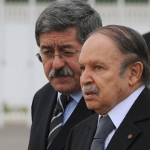Less than a year after President Abdelaziz Bouteflika’s election to a third term on April 14, 2009, Algeria is once again in political crisis. Demonstrations are disrupting vital sectors such as education and health care, while corruption becomes increasingly pervasive. This situation is not at all what Bouteflika and his supporters promised back in November 2008, when the constitution was amended to remove term limits and enable the president to stay in the office he has held since 1999. It is clear now that their true intention was to consolidate the existing political order taking advantage of the improvement in Algeria’s financial situation brought about by an exceptional rise in global oil and gas prices. This inflow of hydrocarbon revenue was used to meet pressing social demands and boost investment in infrastructure.
Regime consolidation is not necessarily equivalent, however, to stability for the country at large. Economic reforms have yet to produce prosperity for most Algerians. The government has expended $120 billion between 2004 and 2009 according to official figures on housing, railroads, and highways as well as higher base salaries for government workers. It is planning to spend an additional $ 150 billion for 2009-2015. Yet this spending has seemingly done nothing to reduce the unemployment rate and build up productive enterprises. Political reforms introduced in the wake of the unrest of October 1988, with the declared goal of building a pluralistic democracy with broad political participation, have instead created a de facto one-party system. The regime is still the principal actor, with three parties—the National Liberation Front, the National Rally for Democracy, and the (moderately Islamic) Movement of Society for Peace—allied with the presidency and monopolizing political life.
In this regard Algeria is not different from most Arab countries, which have carried out incomplete political reforms under domestic and international pressures, altering their political systems superficially without changing their essence. Many countries have constitutions providing for pluralism, political parties, civil society organizations, and regular elections, but the traditional ruling elite still manages these cosmetic changes and holds real power aloof from any institutional or popular oversight.
But what is next for Algeria? Do the powers that be within the regime have options on hand to overcome the current crisis and set the stage for a post-Bouteflika era? These are pressing questions, particularly in light of rumors about the president’s ill health.
Certainly Bouteflika has been nowhere to be seen recently as the issue of corruption has commanded public attention and also factored into the hidden struggle for power among members of the country’s ruling elite. His silence about accusations of rampant corruption in institutions including the state-owned oil company SONATRACH, the lifeline of the Algerian economy, has put his government’s credibility at stake. Minister of Energy Chakib Khalil (who is close to the president) and Minister of Public Works Amar Ghoul are accused of accepting bribes, a scandal that diminishes the power of the president's clique, allowing the other main power broker in Algeria—the army—to gain ground. Corruption also was a factor in the murder of national security director Ali Tounsi, killed in his office on February 25 by a subordinate who was under investigation for taking bribes.
The army has traditionally played a prominent role in Algerian politics, and took charge as the de facto ruler of the country during the bloody fight against terrorism in the 1990s. Since taking power in 1999, Bouteflika has tried to build up the presidency’s strength and give it broad decision-making powers. Because he has avoided creating government institutions that would create a set of checks and balances, influence has remained concentrated in the hands of the army and the president.
Some observers believe that the retirement and passing away of some of the military leadership’s core from the 1990s will alter the face of the military establishment and lead it to intervene more in politics. The political leaders will also change. Bouteflika’s successor is likely to be from a new generation, as those who derived their legitimacy from the Algerian Revolution are largely leaving the scene. One notable exception is former Prime Minister Mouloud Hamrouche, who fought in the revolution at a young age. He is known for his reformist platform, and was a presidential candidate in 1999. Hamrouche stipulates, however, that he would need the explicit consent of the “decision-makers” (meaning the army) to his reformist agenda, and particularly to political and economic liberalization. Another reform-oriented hopeful is Ahmad Benbitour, a technocrat well-versed in economic affairs who was Bouteflika’s prime minister from 1999 to 2000, and who would also insist on sweeping domestic changes.
Current Prime Minister Ahmed Ouyahia is the name most often raised, however, as the likely future president. A compliant technocrat who has headed the government three times, Ouyahia has the blessing of the “decision-makers.” His weakness in the eyes of the public is that he has defended a number of unpopular policies, such as dissolving state-owned economic institutions and firing workers or arresting officials on bribery charges only to have them acquitted.
Whoever eventually follows Bouteflika, the next president will not succeed in establishing true stability and prosperity if he maintains the approach of keeping power in the hands of a few and preventing popular political participation and government accountability. Extensive economic reforms are needed to alleviate the country’s dependence on volatile oil income--currently 97 percent of national revenue-- generate jobs, and improve living conditions for an increasingly disenchanted population. The continuation of politics as usual will delay the emergence of a government capable of tackling these problems and therefore perpetuate Algeria’s vulnerability.
Mahmoud Belhimer is an Algerian journalist and writer.






